Stuck between multiple violent conflicts, one doctor struggles to save those he can.
Even though it serves a community of roughly 200,000 people, Bunj hospital in South Sudan is a bare-bones affair. The walls are dingy, medical supplies are scarce, and there’s only one operating table, which sits starkly in the center of a white-tiled room. With 120 beds, the majority of patients share space on mats and fabric on the well-swept cement floor. The maze of halls within the hospital complex are lined with those awaiting treatment and visitors. Despite the dire straits and outrageous heat, the hospital hums along pleasantly.
It’s not surprising that Dr. Evan Atar, the medical director and the hospital’s only surgeon, doesn’t have a moment to spare. He says his role is not that of a director issuing orders from a corner office. “I don’t have any office, because we are so busy that there is no time for me to sit anywhere,” he says.
Atar thinks in specifics: he remembers the name of the person from Doctors Without Borders who gave him an amputation set when he was starting off at a hospital in Kurmuk, Sudan in July of 1997.
He remembers how long it took to build the airstrip in Yabus, Sudan in 1998. The Sudan People’s Liberation Army (then a guerrilla army, now the armed forces of South Sudan) along with NGO staff and civilian volunteers, planned to get the project done in seven days. It took eight.
These names and dates tape together the blur in which he operates.
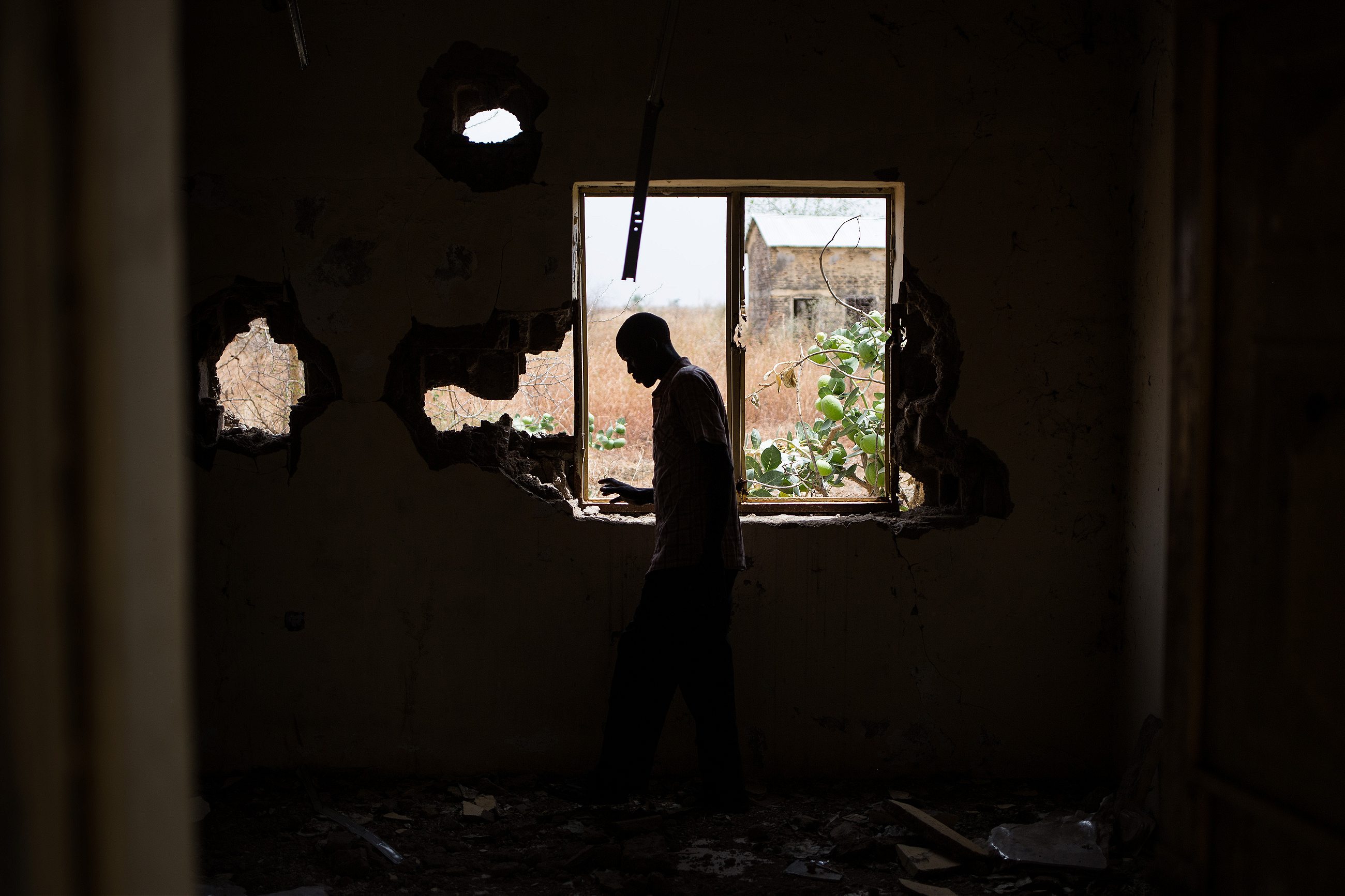
The doctor bustles around for at least half an hour before he gets a moment to breathe. After sitting down at a desk in what appears to be a waiting room, medical aides and patients approach him with quick questions and notes until he finally, gently signals that he needs to focus.
Bunj hospital is in Maban, the northeastern county in South Sudan nestled between Ethiopia to the east and Sudan to the north.
The hospital serves three populations that live between a civil bloodbath and a civil war. Atar has devoted his life to bringing medical aid to this violent pocket of the world.
That violence can seem all encompassing. A genocide is flowering from a power wrangle in South Sudan. That nation celebrated its independence from Sudan in July of 2011 and has been at arms since December of 2013.
At the same time, a war in Sudan’s Blue Nile region between the Sudan People’s Liberation Army-North (SPLN-N) rebels and their government in Khartoum is being fought across the casually guarded border. Blue Nile is the second and lesser known front in a conflict with three active fronts; the other two being the Nuba Mountains and the more internationally known Darfur.
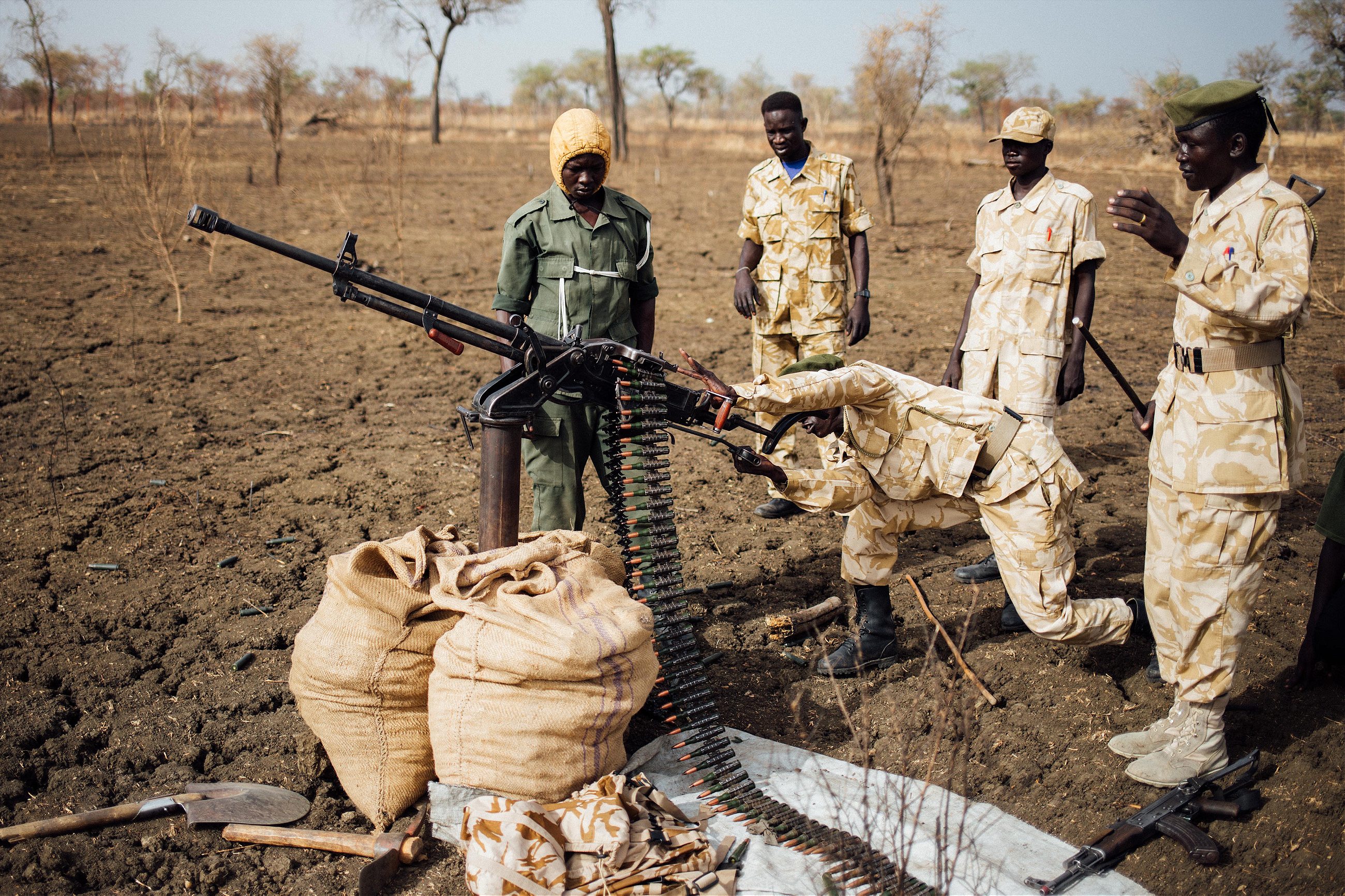
The people of Sudan’s Blue Nile region fought with the southern Sudanese for independence, but weren’t included when the borders were drawn in 2011. The fight today is largely a continuation of the original five-decade battle that led to South Sudan’s independence.
Ground wars, a relentless and indiscriminate bombing campaign, and the inevitable humanitarian crisis pushed more than 135,000 from their homes in rebel-controlled Blue Nile to Maban, where they now live in four heavily militarized camps (refugees say 35 people died in political infighting in the camps in May).
Additionally, the stress and strain on resources has created a tense relationship with the host community, which, at 60,000 is less than half the size of the refugee population. Fighting between the local community and the displaced killed more than 30 people last Christmas.
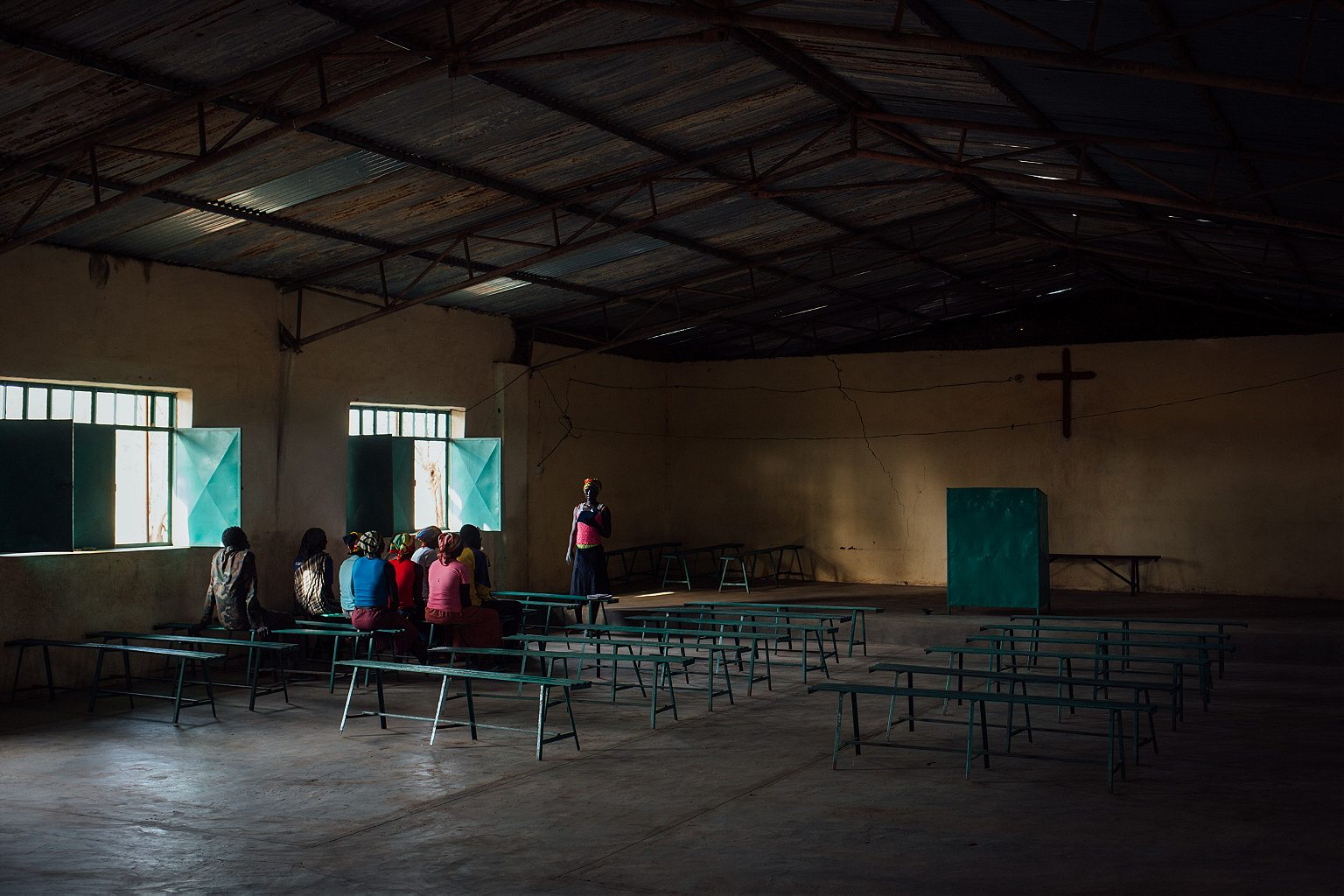
The 135,000 figure doesn’t even factor in the countless individuals who traffic back and forth between South Sudan and Sudan. Blue Nile is destitute: there is no power grid, no medical clinics, and few functioning schools. The markets are bare save some scattered tomatoes and fistfuls of rice in overused plastic bags. Maban is a lifeline for food, fuel, and other resources. Bunj Hospital serves them, too.
Atar is South Sudanese, hailing from Torit in the state of Equatoria (currently a center of fighting). He received a scholarship to attend medical school in Egypt in 1988. After six years of education and one year of training in Alexandria, a chaplain assigned him to Victoria Hospital to help women who had been manipulated into having cesarean sections as part of a doctor-driven scam to increase profits. He was there for about six months, Atar explains, sitting in a green plastic chair in the operating theater.
He was then moved to a larger mission in southern Sudan. In the late 1990s, when Atar was preparing to take the position, the Sudanese civil war was at a full roar.
At his farewell party in Egypt, his colleagues tried to convince him not to move to Sudan. “You will die,” he remembers them saying. He told them, “Death is not in my hand. It’s in the hands of God.”
The colleagues tried another tactic, asking him what he would eat. “I am going to treat human beings. I am a medical doctor. I will eat what they eat,” he remembers telling them.
“Eventually,” he says with a bit of swagger in his voice, “they concluded I had already decided.”
He was sent to Kurmuk in Blue Nile and arrived at a hospital in name only. “Nothing, completely,” he says of the initial situation. There weren’t even pens or pads to take notes. A week later, he received the amputation set from Doctors Without Borders. He used it mostly to operate on people who had been blown up by landmines.
Over ten years, with persistent fundraising, he expanded the hospital until it had a tuberculosis ward and an HIV center.

After South Sudan seceded, war broke out between the Khartoum government and the remaining rebels again in Blue Nile in September of 2011.
By the end of October, with bombs raining down and the government marching towards Kurmuk, it was time to move. He brought the hospital with him. Rounding up assistance, four trucks, and a tractor, he evacuated to the SPLA-held town of Bunj. “It was not a journey of one direction,” he explains of their circuitous route away from the fighting. The group moved from point to point, walking and carrying what they needed, with the cars and tractors going ahead. All in, the trip took one month. Travelled directly, it takes seven or eight hours by car.
He arrived to mayhem. Civilians were rushing south and there were already 110,000 displaced people in the area in addition to the host community. He recalls that these people were not leaving voluntarily. “People were chased [out]. We had so many bullet injuries,” he says. “We were bombed ourselves, several times.”
No international aid organizations and few journalists work in Blue Nile
The first patient on whom he operated in Bunj had been shot. The bullet had ruptured the ascending colon and was lodged in the man’s body. There was no operating theater at the time, so Atar and a nurse worked on the wounded man on a table. He survived and stayed to become a crowd-controller on the hospital compound.
Atar has not worked in Blue Nile since he fled that October. The hospital he carried with him has a new home. Sudan’s President, Omar al-Bashir, declared that any aid organizations operating in rebel-held territory would be considered to be colluding with the opposition and treated accordingly. As a result, no international aid organizations and few journalists work in Blue Nile. More than 4,000 bombs have been dropped on civilian and non-civilian targets alike in Blue Nile in the past five and a half years. Hospitals are not spared.
Today, Blue Nile’s sick and wounded stumble across the border to Bunj hospital. The most severe injuries come courtesy of Antonov jets, Russian-produced bombers that rain destruction on the region. One victim of the bombing is 15-year-old Jima Pame, in the hospital awaiting a skin graft. His back was severely injured in a bombing in November 2015.
Still, he is lucky: another two women were killed in the same bombing.
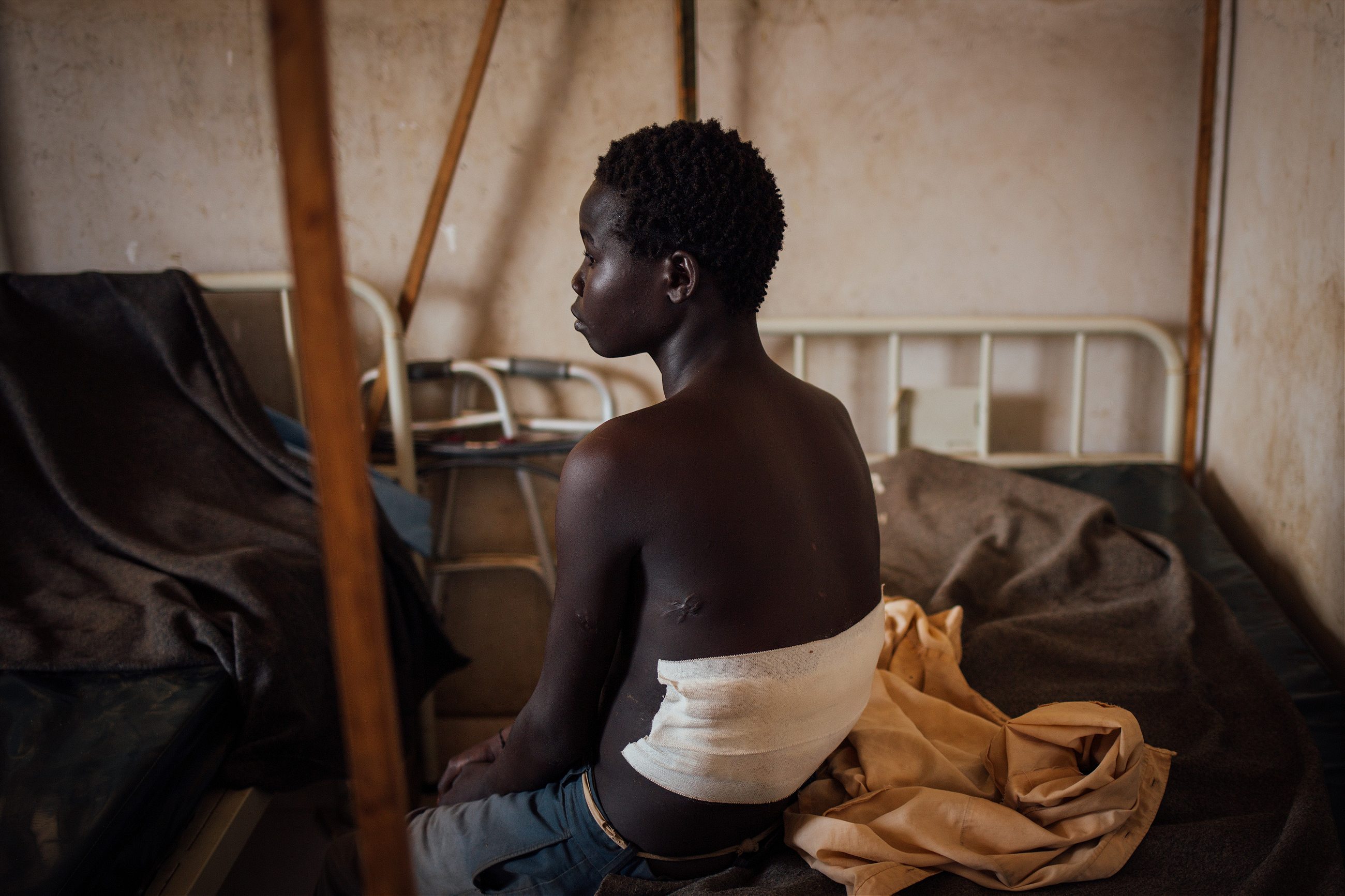
The bombardment is relentless, and Atar thinks it is getting worse. Despite this, few people die of their wounds at the hospital. That, however, is because most people don’t die here in South Sudan; they die back in Blue Nile, too far away to get help. “Two hours, three hours, you can’t rescue someone who has been bleeding [for that long] with no means of stopping the bleeding. They die there,” he explains.
“All the metals are killers,” he says of the drum bombs—metal barrels filled with explosives and shrapnel—that the Sudanese government drops from the Russian planes. “They cut people to pieces.” Still, the drum bombs aren’t accurate, and you can hear the planes coming, so there’s time to react. But in the past year, the government has acquired Sukhoi jets, an updated Russian design which is quick and precise. “It is so accurate. It can hit you sideways,” Atar says.
He is sure the government is trying to kill everyone in Blue Nile. “That is obvious. They want to clear everyone who is living there who does not come under their control or their rules.”
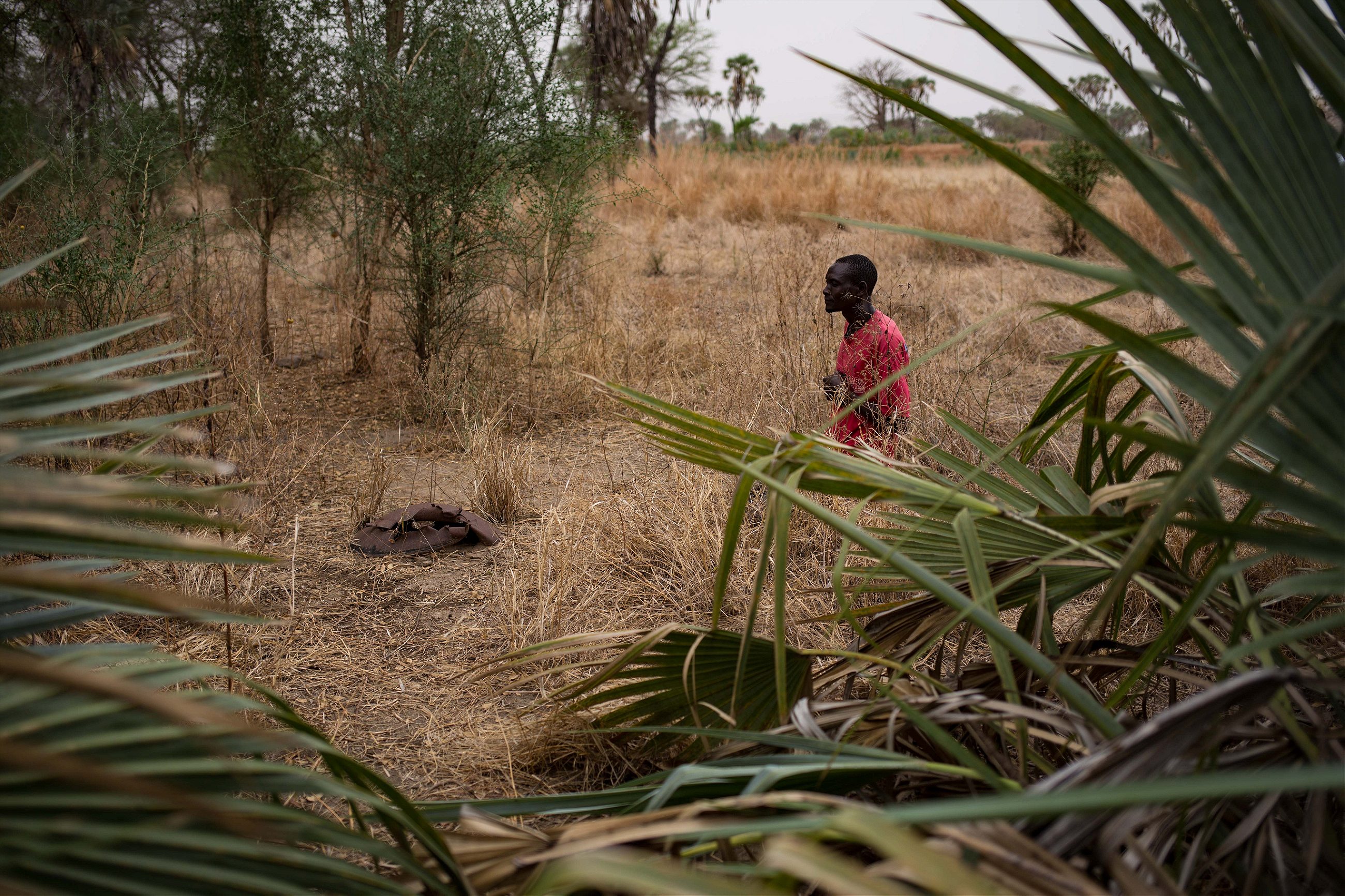
He’s the only South Sudanese surgeon in the county. Most of his colleagues are Ugandan and Kenyan, and they come and go. He’s stayed through the ongoing war in Sudan, and South Sudan’s unraveling, which has also caused plenty of problems for the area. International NGO staffers have been evacuated four or five times, and given his stature in the community, Atar could probably also depart despite his local passport. But he chooses to remain with the few other staff.
He knows he could make more money in the South Sudanese capital of Juba. Colleagues regularly urge him to come to the city. “I tell them, what are you going to give me in Juba? I’m just going to work for money, which I think is really nothing,” he says.
He goes on, “I think I appreciate the life. It’s good for me that way. Rather than to be here than in a place where you [hear] people are suffering, but you don’t do something.”